
KNOWLEDGE AND INFORMATION SYSTEMS
Scope & Guideline
Bridging Theory and Practice in Information Systems
Introduction
Aims and Scopes
- Knowledge Representation and Management:
This area focuses on the development and utilization of knowledge representation techniques, including ontologies and knowledge graphs, to enhance data interoperability and information retrieval. - Machine Learning and Data Mining:
The journal covers advancements in machine learning algorithms and data mining techniques, particularly their application in real-world scenarios such as healthcare, finance, and social networks. - Recommender Systems:
A significant focus is placed on the design and optimization of recommender systems, exploring collaborative filtering, content-based approaches, and hybrid models to improve user experience and personalization. - Graph-Based Methods:
The use of graph theory in various applications such as social network analysis, knowledge graph construction, and recommendation systems is a core area of research. - Natural Language Processing (NLP):
Research in NLP includes sentiment analysis, question answering, and information extraction, often leveraging deep learning techniques to enhance understanding and processing of human language. - Big Data Analytics:
The journal also emphasizes methodologies for processing and analyzing large volumes of data, with applications across different sectors including healthcare, finance, and social media. - Cybersecurity:
There is a growing interest in cybersecurity research, focusing on intrusion detection, anomaly detection, and secure data management practices. - Interdisciplinary Applications:
Research that intersects with various fields such as healthcare, education, and environmental sciences is encouraged, showcasing the versatility of knowledge and information systems.
Trending and Emerging
- Explainable AI (XAI):
There is a growing trend towards research that emphasizes the interpretability and transparency of AI models, ensuring that users can understand and trust automated decisions. - Federated Learning:
Federated learning is gaining traction as a means of enabling collaborative model training while preserving data privacy, particularly in sensitive domains such as healthcare. - Multi-modal Learning:
Research that integrates multiple data modalities (e.g., text, images, and audio) is on the rise, reflecting the need for more holistic approaches to data analysis. - Sustainable Computing:
There is an increasing focus on sustainable computing practices, including energy-efficient algorithms and environmentally friendly data processing techniques. - Blockchain and Decentralized Systems:
The application of blockchain technology in knowledge and information systems is trending, particularly in areas such as data integrity, security, and decentralized applications. - Social Network Analysis:
Research in social network analysis is becoming more prevalent, exploring the dynamics of user interactions and information dissemination in digital environments. - AI for Healthcare:
The intersection of AI and healthcare is a rapidly emerging theme, with a focus on predictive analytics, patient outcome improvement, and personalized medicine. - Data Ethics and Governance:
An increasing emphasis on ethical considerations in data usage and the governance of data practices is being observed, reflecting societal concerns regarding privacy and bias.
Declining or Waning
- Traditional Statistical Methods:
There appears to be a waning interest in traditional statistical methods for data analysis, as researchers increasingly favor machine learning and deep learning approaches that offer greater flexibility and scalability. - Rule-Based Systems:
The use of rule-based systems has diminished, with a shift towards more adaptive, data-driven methodologies that can better handle the complexities of modern data. - Simple Data Visualization Techniques:
Basic data visualization techniques are becoming less prevalent, as there is a growing demand for more sophisticated and interactive visualization tools that can handle large datasets. - Classic Information Retrieval Models:
Classic models of information retrieval are seeing less focus, giving way to more advanced techniques that incorporate machine learning and semantic understanding. - Generic Cloud Computing Solutions:
Research on generic cloud computing solutions is declining, with a shift towards more specialized and optimized cloud architectures tailored to specific applications.
Similar Journals
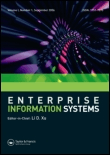
Enterprise Information Systems
Shaping Tomorrow's Information Landscape.Enterprise Information Systems, published by Taylor & Francis Ltd, is a prestigious academic journal dedicated to the dynamic field of information systems, emphasizing the intersection of technology and business processes. With a notable impact factor reflecting its significance in the scholarly community, the journal ranks in the Q2 category for Computer Science Applications and Q1 for Information Systems and Management as of 2023. Covering a broad scope from theoretical foundations to practical implementations, this journal serves as a crucial platform for disseminating cutting-edge research that enhances understanding of enterprise systems and their effective integration within organizations. Researchers, professionals, and students will find valuable insights in its pages, with contributions that shape the future of enterprise information systems. Established in 2007 and continuing through 2024, Enterprise Information Systems is essential for anyone looking to stay at the forefront of trends and advancements in this evolving field.
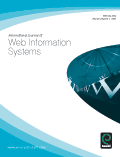
International Journal of Web Information Systems
Exploring the frontiers of web technology research.The International Journal of Web Information Systems is a distinguished publication dedicated to advancing the field of web information systems, offering a platform for high-quality research and innovative practices. Published by EMERALD GROUP PUBLISHING LTD in the United Kingdom, this journal has established itself as a vital resource for researchers, practitioners, and academics from various disciplines, particularly in Computer Networks and Communications and Information Systems, as evidenced by its ranking in the 2023 quartile assessments (Q3) and Scopus rankings. With an H-index reflecting its impact within the academic community and a publication window spanning from 2005 to 2024, the journal is committed to fostering scholarly exchange and collaboration. While it currently does not have open access options, it provides valuable insights and breakthroughs that are essential for professionals and students navigating the ever-evolving digital landscape.

JOURNAL OF INFORMATION SCIENCE AND ENGINEERING
Connecting Researchers in the Evolving World of Information.JOURNAL OF INFORMATION SCIENCE AND ENGINEERING, published by the Institute of Information Science in Taiwan, is a pivotal platform for the dissemination of innovative research in the multidisciplinary fields of information science and engineering. Established in 1993, the journal primarily focuses on areas such as library and information sciences, human-computer interaction, hardware and architecture, as well as computational theory and software development. Despite holding a current Q4 ranking in several categories, the journal demonstrates significant potential for growth, particularly in computation and software systems, as evidenced by its Scopus rankings and percentiles. Researchers, professionals, and students will find this journal to be an invaluable resource to stay abreast of evolving theories and technologies in information science. The journal is accessible through traditional subscription models, fostering a broad academic outreach. It serves to enhance knowledge-sharing and collaboration within this dynamic and ever-evolving field.
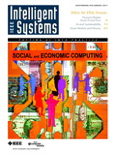
IEEE INTELLIGENT SYSTEMS
Connecting Minds Through Intelligent TechnologiesIEEE Intelligent Systems, published by the renowned IEEE Computer Society, stands at the forefront of research in the fields of Artificial Intelligence and Computer Networks and Communications. With an impressive Q1 ranking in both categories as of 2023 and Scopus rankings placing it in the top 5% of its field, this journal not only showcases cutting-edge scientific advancements but also serves as a vital resource for practitioners, academics, and students seeking to deepen their understanding and application of intelligent systems. The journal covers a broad range of topics including machine learning, data mining, and system architectures, reflecting its commitment to addressing contemporary challenges and innovations in technology. Although it does not offer open access, the journal's research contributions are invaluable, ensuring that its readership remains engaged with the latest findings and applications in a rapidly evolving field. For those interested in submitting high-quality research or staying updated on the latest developments, IEEE Intelligent Systems represents an essential hub of knowledge.

KNOWLEDGE ORGANIZATION
Exploring Innovative Frameworks in Knowledge SystemsKNOWLEDGE ORGANIZATION is a prominent journal in the field of Library and Information Sciences, published by NOMOS Verlagsgesellschaft mbH & Co KG. With an impressive impact reflected by its 2023 Q2 category ranking and a Scopus rank of #135 out of 280 in its discipline, this journal serves as a vital platform for disseminating research that advances our understanding of knowledge organization systems and practices. Since its inception in 1993, the journal has provided a convergence of innovative theoretical frameworks and practical applications that address the complexities of organizing knowledge in an ever-evolving information landscape. Although it currently does not offer open access options, KNOWLEDGE ORGANIZATION continues to be essential for researchers, practitioners, and students eager to explore critical methodologies and emerging trends within the field. For those interested in contributing to or gaining insight from high-quality research relevant to library and information sciences, this journal remains an invaluable resource.

Data Science and Engineering
Elevating knowledge at the crossroads of technology and data.Data Science and Engineering is a premier open access journal published by SPRINGERNATURE, dedicated to advancing the fields of data science, artificial intelligence, computational mechanics, and information systems. Since its inception in 2016, this journal has rapidly established itself as a leader in the academic community, boasting an impressive Q1 ranking in multiple computer science categories, including Artificial Intelligence, Software, and Information Systems. With a commitment to disseminating high-quality research, it caters to a diverse audience of researchers, professionals, and students eager to explore the intersection of data and technology. The journal's robust global reach, combined with its respected reputation, empowers authors to share their findings widely, facilitating breakthroughs and innovations across the digital landscape. Join the vibrant community of scholars contributing to this integral field of study, and stay informed with the latest research by accessing the journal freely online.

JOURNAL OF INTELLIGENT INFORMATION SYSTEMS
Bridging Academia and Industry in Intelligent SolutionsThe Journal of Intelligent Information Systems, published by Springer since 1992, is a premier academic journal that offers a multidisciplinary platform in the fields of Artificial Intelligence, Computer Networks and Communications, Hardware and Architecture, Information Systems, and Software. With an impressive impact reflected in its 2023 Q2 category rankings across multiple domains and a commendable standing in the Scopus Rankings—ranking #84 in Computer Networks and Communications and #101 in Artificial Intelligence—the journal is recognized for its contribution to advancing knowledge and innovation. Although it is not an open-access journal, its accessibility through institutional subscriptions ensures that a wide range of researchers, professionals, and students can engage with high-quality, peer-reviewed research that addresses the latest advancements and trends in intelligent systems. For over three decades, this journal has effectively bridged gaps between academia and industry, making it a vital resource for those aiming to push boundaries in intelligent information systems.
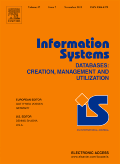
INFORMATION SYSTEMS
Charting new territories in Hardware and Software advancements.INFORMATION SYSTEMS is a premier journal published by PERGAMON-ELSEVIER SCIENCE LTD, dedicated to advancing the fields of Information Systems, Hardware and Architecture, and Software. With its ISSN 0306-4379 and E-ISSN 1873-6076, this prestigious journal has established a significant presence in the academic community since its inception in 1975, paving the way for innovative research that continues through 2025. Ranked within the Q1 quartile across its core categories, INFORMATION SYSTEMS holds a notable position, with Scopus rankings including #28 in Computer Science - Hardware and Architecture and #64 in Software, both in the 84th percentile. Although it currently does not offer open access, the journal thrives as a vital resource for researchers, professionals, and students, fostering an environment where cutting-edge studies and industry applications converge. Housed in the United Kingdom, at The Boulevard, Langford Lane, Kidlington, Oxford OX5 1GB, England, this journal highlights its commitment to driving scholarly advancements and supporting the evolution of information technologies.

JOURNAL OF COMPUTER SCIENCE AND TECHNOLOGY
Catalyzing Knowledge in Computer Science and EngineeringJOURNAL OF COMPUTER SCIENCE AND TECHNOLOGY, published by Springer Singapore Pte Ltd, is a pivotal platform in the rapidly evolving realms of computer science and technology. With an ISSN of 1000-9000 and an E-ISSN of 1860-4749, this journal encompasses a diverse array of topics including computational theory, hardware and architecture, software engineering, and applications of computer science. Spanning over three decades from 1986 to 2024, it boasts an impressive standing within academic circles, ranking in the Q2 quartile across several key categories and achieving notable placement in Scopus metrics. Although this journal operates under a subscription-based model, it remains a crucial resource for researchers, professionals, and students seeking to advance their knowledge and contribute to discussions in computer science. The JOURNAL OF COMPUTER SCIENCE AND TECHNOLOGY is committed to fostering innovation and scholarly communication in the field, encouraging submissions that contribute substantive advancements in theory and application.
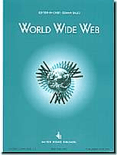
WORLD WIDE WEB-INTERNET AND WEB INFORMATION SYSTEMS
Exploring the Frontiers of Web TechnologiesWORLD WIDE WEB - INTERNET AND WEB INFORMATION SYSTEMS, published by Springer, is a leading academic journal that focuses on the cutting-edge areas of Internet technologies and web-based information systems. With an esteemed ISSN of 1386-145X and an E-ISSN of 1573-1413, this journal has been a significant contributor to the fields of Computer Networks and Communications, Hardware and Architecture, and Software since its inception in 1998. The journal consistently ranks in the Q1 category across these fields, reflecting its high impact and relevance, evidenced by its impressive Scopus rankings where it stands in the upper percentiles (79th for Computer Networks and Communications, 77th for Hardware and Architecture, and 75th for Software). Researchers, professionals, and students looking to stay at the forefront of web information systems will find a wealth of valuable resources and innovative research compellingly presented in this journal, available for publication until 2024.